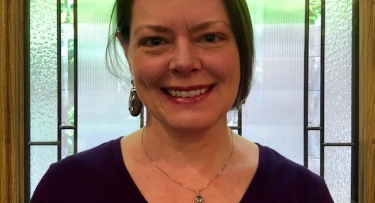Future Teachers in Mercy’s School of Education Explore Diversity, Equity and Inclusion

Mercy College Assistant Professor of Secondary Education Erica Newhouse
Diversity, equity and inclusion are topics that are central to the field of education, especially in K-12 schools where educators work to meet the needs of diverse students, ensure each child receives a strong education and ultimately help shape a more just, equitable society.
In order to ensure that future teachers are prepared to do this vital work, Erica Newhouse, Ph.D. — an assistant professor in Mercy College’s School of Education — guides her students at Mercy to both grapple with their own views and devise ways to tackle these issues with their future students.
“Every teacher who steps into a classroom needs to be able to talk about race, diversity and social justice with students,” said Newhouse, who teaches multiple courses in the School of Education’s secondary English program. “This is how we meet students’ needs in these complex, sometimes scary times.”
In light of the mass protests in the summer of 2020, Newhouse felt that pre-service teachers needed to be more knowledgeable about issues of diversity, equity and inclusion that were impacting K-12 students. She incorporated relevant materials into her courses — such as the guiding principles behind the Black Lives Matter movement and a TED Talk about speaking up against injustice — with an invitation for Mercy students to “join the conversation about the education students expect, demand and deserve.”
All of Newhouse’s courses include assignments that prompt Mercy students to investigate how traditional approaches to content and teaching strategies can contribute to continued inequity and inequality in classrooms and schools. In the course EDUC 511D: Methods and Materials in Secondary English Education — which Mercy students take right before they begin student teaching — students developed a teaching unit around a culturally relevant young adult text written by an author from the New York City area. “Culturally relevant pedagogy means connecting what’s happening in the outside world to what’s happening in the classroom,” explained Newhouse.
While Steven Fowler, M.S. ’21, was a student in two of Newhouse’s classes, he designed a teaching unit that explored policing in the U.S. He chose texts such as “Bodega Dreams” by Ernesto Quiñonez and “Between the World and Me” by Ta-Nehisi Coates as a way for his students to interrogate the American Dream and who it belongs to, a topic that felt particularly relevant to him after the Black Lives Matter Movement gained steam in 2020. “I’ve been thinking about whether I really needed to read Charles Dickens in high school,” he said. “Is that the most important text that I could have read as a teenager? I wanted to write a unit that would be meaningful to my students and relevant to the world we’re living in.”
For the course ENGE 540: Applied Grammar, Newhouse’s students attended KidLit Rally for Black Lives — an online event led by notable children’s authors after George Floyd’s death — as part of their virtual fieldwork. “I wanted students to understand the connections between writers and readers and how even teaching grammar can be culturally responsive,” Newhouse said. After the event, Catherine Brudi ’20, M.S. ’21, reflected on her new understanding of grammar’s close connection to race and class: “The grammar that is taught today and considered correct is what was historically used by upper-class white people…. Learning taught in white-dominated schools created language standards and became yet another basis of segregation and racism.”
In Newhouse’s classes, the projects around diversity and inclusion made Brudi reflect on her own views and her role as a teacher. “I was keeping issues of race and privilege at arm’s length, but with these assignments, I was forced to take them on,” she said. “The assignments woke me up. History is happening right now. And we can't just ignore it.”
Now, Brudi feels a deep responsibility to use her voice and position to make real change: “As a future educator who is white, I have the power to use my privilege as a tool to end this recurring theme of racism. It is time to break the mold that we were educated in, to want more for our students and the society that they will grow up in. Silence is no longer a choice for me. My future students are depending on me.”
